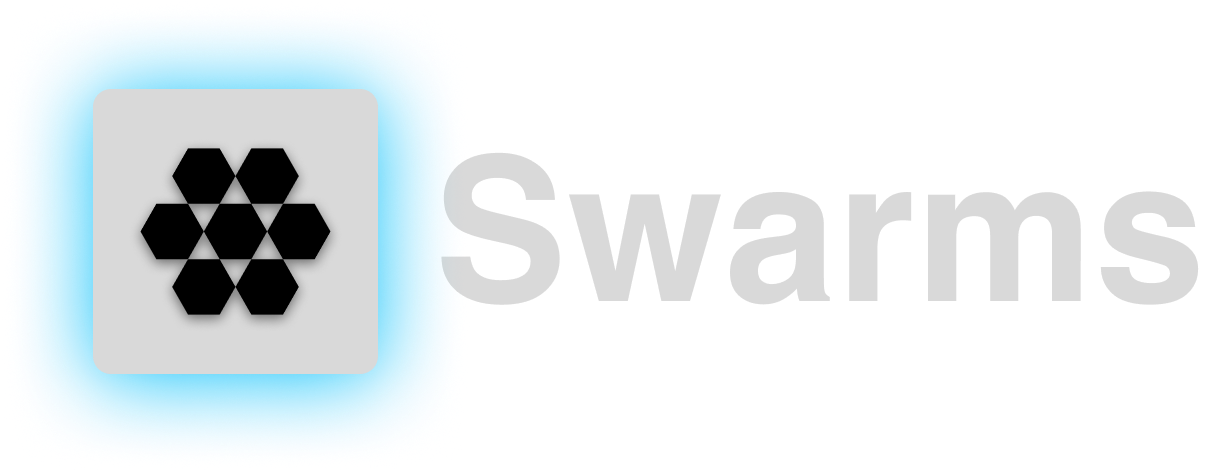|
|
2 years ago | |
|---|---|---|
| .github | 2 years ago | |
| api | 2 years ago | |
| apps | 2 years ago | |
| docs | 2 years ago | |
| images | 2 years ago | |
| infra | 2 years ago | |
| playground | 2 years ago | |
| swarms | 2 years ago | |
| tests | 2 years ago | |
| .env.example | 2 years ago | |
| .gitignore | 2 years ago | |
| .pre-commit-config.yaml | 2 years ago | |
| .readthedocs.yml | 2 years ago | |
| CONTRIBUTING.md | 2 years ago | |
| Dockerfile | 2 years ago | |
| LICENSE | 2 years ago | |
| README.md | 2 years ago | |
| bingchat.py | 2 years ago | |
| example.py | 2 years ago | |
| mkdocs.yml | 2 years ago | |
| pyproject.toml | 2 years ago | |
| requirements.txt | 2 years ago | |
| setup.py | 2 years ago | |
| stacked_worker.py | 2 years ago | |
README.md
Swarms is a modular framework that enables reliable and useful multi-agent collaboration at scale to automate real-world tasks.
Share on Social Media
Purpose
At Swarms, we're transforming the landscape of AI from siloed AI agents to a unified 'swarm' of intelligence. Through relentless iteration and the power of collective insight from our 1500+ Agora researchers, we're developing a groundbreaking framework for AI collaboration. Our mission is to catalyze a paradigm shift, advancing Humanity with the power of unified autonomous AI agent swarms.
🤝 Schedule a 1-on-1 Session
Book a 1-on-1 Session with Kye, the Creator, to discuss any issues, provide feedback, or explore how we can improve Swarms for you.
Installation
pip3 install swarms
Usage
We have a small gallery of examples to run here, for more check out the docs to build your own agent and or swarms!
MultiAgentDebate
MultiAgentDebateis a simple class that enables multi agent collaboration.
from swarms.workers import Worker
from swarms.swarms import MultiAgentDebate, select_speaker
from swarms.models import OpenAIChat
llm = OpenAIChat(
model_name='gpt-4',
openai_api_key="api-key",
temperature=0.5
)
node = Worker(
llm=llm,
ai_name="Optimus Prime",
ai_role="Worker in a swarm",
external_tools = None,
human_in_the_loop = False,
temperature = 0.5,
)
node2 = Worker(
llm=llm,
ai_name="Bumble Bee",
ai_role="Worker in a swarm",
external_tools = None,
human_in_the_loop = False,
temperature = 0.5,
)
node3 = Worker(
llm=llm,
ai_name="Bumble Bee",
ai_role="Worker in a swarm",
external_tools = None,
human_in_the_loop = False,
temperature = 0.5,
)
agents = [
node,
node2,
node3
]
# Initialize multi-agent debate with the selection function
debate = MultiAgentDebate(agents, select_speaker)
# Run task
task = "What were the winning boston marathon times for the past 5 years (ending in 2022)? Generate a table of the year, name, country of origin, and times."
results = debate.run(task, max_iters=4)
# Print results
for result in results:
print(f"Agent {result['agent']} responded: {result['response']}")
Worker
- The
Workeris an fully feature complete agent with an llm, tools, and a vectorstore for long term memory! - Place your api key as parameters in the llm if you choose!
- And, then place the openai api key in the Worker for the openai embedding model
from swarms.models import ChatOpenAI
from swarms.workers import Worker
llm = ChatOpenAI(
model_name='gpt-4',
openai_api_key="api-key",
temperature=0.5
)
node = Worker(
llm=llm,
ai_name="Optimus Prime",
#openai key for the embeddings
openai_api_key="sk-eee"
ai_role="Worker in a swarm",
external_tools = None,
human_in_the_loop = False,
temperature = 0.5,
)
task = "What were the winning boston marathon times for the past 5 years (ending in 2022)? Generate a table of the year, name, country of origin, and times."
response = node.run(task)
print(response)
OmniModalAgent
- OmniModal Agent is an LLM that access to 10+ multi-modal encoders and diffusers! It can generate images, videos, speech, music and so much more, get started with:
from swarms.models import OpenAIChat
from swarms.agents import OmniModalAgent
llm = OpenAIChat(model_name="gpt-4")
agent = OmniModalAgent(llm)
agent.run("Create a video of a swarm of fish")
- OmniModal Agent has a ui in the root called
python3 omni_ui.py
Documentation
For documentation, go here, swarms.apac.ai
✨ Features
- Easy to use Base LLMs,
OpenAIPalmAnthropicHuggingFace - Enterprise Grade, Production Ready with robust Error Handling
- Multi-Modality Native with Multi-Modal LLMs as tools
- Infinite Memory Processing: Store infinite sequences of infinite Multi-Modal data, text, images, videos, audio
- Usability: Extreme emphasis on useability, code is at it's theortical minimum simplicity factor to use
- Reliability: Outputs that accomplish tasks and activities you wish to execute.
- Fluidity: A seamless all-around experience to build production grade workflows
- Speed: Lower the time to automate tasks by 90%.
- Simplicity: Swarms is extremely simple to use, if not thee simplest agent framework of all time
- Powerful: Swarms is capable of building entire software apps, to large scale data analysis, and handling chaotic situations
Contribute
We're always looking for contributors to help us improve and expand this project. If you're interested, please check out our Contributing Guidelines.
Optimization Priorities
-
Reliability: Increase the reliability of the swarm - obtaining the desired output with a basic and un-detailed input.
-
Speed: Reduce the time it takes for the swarm to accomplish tasks by improving the communication layer, critiquing, and self-alignment with meta prompting.
-
Scalability: Ensure that the system is asynchronous, concurrent, and self-healing to support scalability.
Our goal is to continuously improve Swarms by following this roadmap, while also being adaptable to new needs and opportunities as they arise.
Demos
Swarm Video Demo {Click for more}
Contact
For enterprise and production ready deployments, allow us to discover more about you and your story, book a call with us here

















